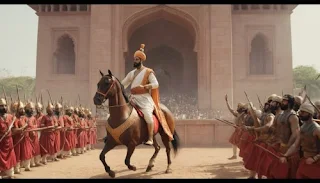Chhatrapati Shivaji Maharaj (1630-1680) was a legendary Indian king who carved out the Maratha Empire in western India. He is revered as a hero for his military prowess, his defense of Hinduism, and his progressive policies.
Early life and rise to power
Shivaji was born into the Bhonsle clan, a Maratha royal family on 19 February 1630. His birthday is celebrated as Maharaj Shivaji jayanti. His father, Shahaji Bhonsle, served as a military commander for the Adil Shahi dynasty of Bijapur. Shivaji received a rigorous military education and soon displayed his talent for leadership and warfare.
In 1645, at the young age of 15, Shivaji captured his first fort, Torna. This marked the beginning of his long and successful military career. He went on to conquer numerous forts and territories, expanding his kingdom and challenging the dominant Mughal Empire.
Defense of Dharma
Shivaji was a devout Hindu and saw himself as a protector of Dharma, the righteous way of life. He fought against the Mughal Empire, which was seen by many Hindus as a threat to their religion and culture. He also protected Hindu pilgrims and shrines from attacks by Muslim rulers.
Forger of an Empire
Shivaji's military successes and his policies of religious tolerance and social justice helped him unite the Maratha people. He established a strong and efficient administration, and his empire flourished. He is considered the founder of the Maratha Empire, which played a significant role in Indian history for over two centuries.
Legacy
Shivaji is considered one of the greatest Indian rulers of all time. He is admired for his courage, his military genius, and his statesmanship. He is also seen as a symbol of Hindu resistance against Muslim rule. His legacy continues to inspire millions of people in India and around the world.
Controversies
Chhatrapati Shivaji's legacy is multifaceted and complex, inspiring both admiration and debate. Although he is widely celebrated for his military prowess and leadership, some aspects of his rule have been controversial.
- His methods of warfare: Some consider his guerrilla tactics and surprise attacks innovative and daring, while others view them as ruthless and destructive. Image from Wikipedia
- His treatment of conquered populations: While he's sometimes lauded for religious tolerance, there are also accounts of instances where he imposed taxes or targeted specific communities.
- His social reforms: His policies aimed at improving the lives of peasants and lower castes are praised by some, while others argue they didn't go far enough or had unintended consequences.

.jpg)


.jpg)
.jpeg)




0 Comments